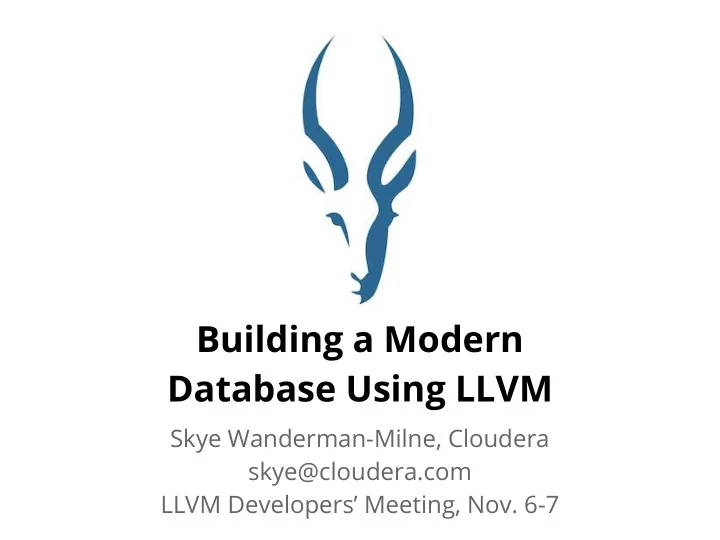

Building a Modern Database Using LLVM Skye Wanderman-Milne, Cloudera skye@cloudera.com LLVM Developers’ Meeting, Nov. 6-7
Overview ● What is Cloudera Impala? ● Why code generation? ● Writing IR vs. cross compilation ● Results
What is Cloudera Impala? ● High-performance distributed SQL engine for Hadoop ○ Similar to Google’s Dremel ○ Designed for analytic workloads ● Reads/writes data from HDFS, HBase ○ Schema on read ○ Queries data directly from supported formats: text (CSV), Avro, Parquet, and more ● Open-source (Apache licensed)
What is Cloudera Impala? ● Primary goal: SPEED! ● Uses LLVM to JIT compile query-specific functions
Why code generation? Code generation (codegen) lets us use query- specific information to do less work ● Remove conditionals ● Propagate constant offsets, pointers, etc. ● Inline virtual functions calls
void MaterializeTuple(char* tuple) { void MaterializeTuple(char* tuple) { for (int i = 0; i < num_slots_; ++i) { *(tuple + 0) = ParseInt(); // i = 0 char* slot = tuple + offsets_[i]; *(tuple + 4) = ParseBoolean(); // i = 1 switch(types_[i]) { *(tuple + 5) = ParseInt(); // i = 2 case BOOLEAN: } *slot = ParseBoolean(); break; case INT: *slot = ParseInt(); break; case FLOAT: … case STRING: … // etc. } } } interpreted codegen’d
void MaterializeTuple(char* tuple) { void MaterializeTuple(char* tuple) { for (int i = 0; i < num_slots_; ++i) { *(tuple + 0) = ParseInt(); // i = 0 char* slot = tuple + offsets_[i]; *(tuple + 4) = ParseBoolean(); // i = 1 switch(types_[i]) { *(tuple + 5) = ParseInt(); // i = 2 case BOOLEAN: } *slot = ParseBoolean(); break; case INT: *slot = ParseInt(); break; case FLOAT: … case STRING: … // etc. } } } interpreted codegen’d
void MaterializeTuple(char* tuple) { void MaterializeTuple(char* tuple) { for (int i = 0; i < num_slots_; ++i) { *(tuple + 0) = ParseInt(); // i = 0 char* slot = tuple + offsets_[i]; *(tuple + 4) = ParseBoolean(); // i = 1 switch(types_[i]) { *(tuple + 5) = ParseInt(); // i = 2 case BOOLEAN: } *slot = ParseBoolean(); break; case INT: *slot = ParseInt(); break; case FLOAT: … case STRING: … // etc. } } } interpreted codegen’d
void MaterializeTuple(char* tuple) { void MaterializeTuple(char* tuple) { for (int i = 0; i < num_slots_; ++i) { *(tuple + 0) = ParseInt(); // i = 0 char* slot = tuple + offsets_[i]; *(tuple + 4) = ParseBoolean(); // i = 1 switch(types_[i]) { *(tuple + 5) = ParseInt(); // i = 2 case BOOLEAN: } *slot = ParseBoolean(); break; case INT: *slot = ParseInt(); break; case FLOAT: … case STRING: … // etc. } } } interpreted codegen’d
User-Defined Functions (UDFs) ● Allows users to extend Impala’s functionality by writing their own functions e.g. select my_func(c1) from table; ● Defined as C++ functions ● UDFs can be compiled to IR (vs. native code) with Clang ⇒ inline UDFs
IntVal my_func(const IntVal& v1, const IntVal& v2) { return IntVal(v1.val * 7 / v2.val); } SELECT my_func(col1 + 10, col2) FROM ... function pointer my_func function function pointer pointer + col2 (col1 + 10) * 7 / col2 function function pointer pointer col1 10 interpreted codegen’d
User-Defined Functions (UDFs) Future work: UDFs in other languages with LLVM frontends
Two choices for code generation: ● Use the C++ API to handcraft IR ● Compile C++ to IR
void MaterializeTuple(char* tuple) { void MaterializeTuple(char* tuple) { for (int i = 0; i < num_slots_; ++i) { *(tuple + 0) = ParseInt(); // i = 0 char* slot = tuple + offsets_[i]; *(tuple + 4) = ParseBoolean(); // i = 1 switch(types_[i]) { *(tuple + 5) = ParseInt(); // i = 2 case BOOLEAN: } *slot = ParseBoolean(); break; case INT: *slot = ParseInt(); break; case FLOAT: … case STRING: … // etc. } } } interpreted codegen’d
void HdfsAvroScanner::MaterializeTuple(MemPool* pool, uint8_t** data, Tuple* tuple) { BOOST_FOREACH(const SchemaElement& element, avro_header_->schema) { const SlotDescriptor* slot_desc = element.slot_desc; bool write_slot = false; void* slot = NULL; PrimitiveType slot_type = INVALID_TYPE; if (slot_desc != NULL) { write_slot = true; slot = tuple->GetSlot(slot_desc->tuple_offset()); slot_type = slot_desc->type(); } avro_type_t type = element.type; if (element.null_union_position != -1 && !ReadUnionType(element.null_union_position, data)) { type = AVRO_NULL; } switch (type) { case AVRO_NULL: Native if (slot_desc != NULL) tuple->SetNull(slot_desc->null_indicator_offset()); break; case AVRO_BOOLEAN: interpreted ReadAvroBoolean(slot_type, data, write_slot, slot, pool); break; case AVRO_INT32: ReadAvroInt32(slot_type, data, write_slot, slot, pool); function break; case AVRO_INT64: ReadAvroInt64(slot_type, data, write_slot, slot, pool); break; case AVRO_FLOAT: ReadAvroFloat(slot_type, data, write_slot, slot, pool); break; case AVRO_DOUBLE: ReadAvroDouble(slot_type, data, write_slot, slot, pool); break; case AVRO_STRING: case AVRO_BYTES: ReadAvroString(slot_type, data, write_slot, slot, pool); break; default: DCHECK(false) << "Unsupported SchemaElement: " << type; } } }
Recommend
More recommend